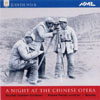Weir Night at the Chinese Opera
A fine first recording of Weir’s mid-1980s opera on the life of a Chinese architect
View record and artist detailsRecord and Artist Details
Composer or Director: Judith Weir
Genre:
Opera
Label: NMC
Magazine Review Date: 11/2000
Media Format: CD or Download
Media Runtime: 0
Catalogue Number: NMCD060

Tracks:
| Composition | Artist Credit |
|---|---|
| (A) Night at the Chinese Opera |
Judith Weir, Composer
Adey Grummet, Little Moon/Actor, Soprano Adrian Thompson, Old P'eng/Old Mountain Dweller, Tenor Andrew Parrott, Conductor Frances Lynch, Actor, Mezzo soprano Frances McCafferty, Mrs Chin/Old Crone, Mezzo soprano Gwion Thomas, Chao Lin, Baritone Judith Weir, Composer Karl Morgan Daymond, Actor, Tenor Michael Chance, Military Governor, Alto Michael George, Mongolian Soldier, Bass Scottish Chamber Orchestra Timothy Robinson, Nightwatchman/Marco Polo/Fireman, Tenor |
Author: Arnold Whittall
Judith Weir’s first large-scale work for the theatre, composed in 1986-87, is an assured demonstration of in-debted independence. An enterprising commission from Kent Opera enabled her to reflect on the then-current state of music drama in England, torn as it was between continued allegiance to opera according to 19th-century traditions, and newer ideas about ‘music theatre’. Acknowledging the towering precedent of Birtwistle’s Punch and Judy, Weir devised an entertainment no less dependent on pantomime, but free of complex expressionism. Her direct, uninhibited musical style evokes (among others) the more playful Stravinsky and the celebratory Messiaen, but quite without nudging pastiche, save in the witty ‘Recitativo’, to an Italian text, for Marco Polo: and the immediate appeal of her music is summed up by the opera’s final tune, which seems obliquely affiliated to the Eton Boating Song.
This is, essentially, a number opera, unfolding in short scenes which tell the story of the life and death of Chao Lin, a 13th-century Chinese architect with a social conscience who resists oppression and is finally executed. There are several different strands to the story, not least the play-within-a-play which forms Weir’s Act 2, and in which her Brechtian aspirations are most explicit. Needing to project the text at the speed of knockabout pantomime, she reduces the musical input to a minimum, and although audience enjoyment is evident on this live recording, her reliance on ‘funny voices’ and visible action pose a few problems for the CD listener. But the music in the outer acts is vividly atmospheric, and anyone who already knows Weir’s later opera Blond Eckbert will recognise anticipations of that work’s more lyric, romantic style, especially in Chinese Opera’s Act 3.
Although the performance recorded here was a one-off, there’s no sense of anyone in the cast trying out an unfamiliar role. Several of them had performed the work before anyway, and Andrew Parrott, here making an all-too-rare foray into the contemporary repertory, conducted the first run of performances. The recording is as responsive to the composer’s imaginative instrumentation as to the constantly shifting interactions of the singing actors. Judith Weir’s later stage works are, on the whole, more subtle, more lyrical and more varied – in a word, more operatic – than A Night at the Chinese Opera. But it remains an engaging example of her special ability to combine comic and serious elements in attractively original ways.'
This is, essentially, a number opera, unfolding in short scenes which tell the story of the life and death of Chao Lin, a 13th-century Chinese architect with a social conscience who resists oppression and is finally executed. There are several different strands to the story, not least the play-within-a-play which forms Weir’s Act 2, and in which her Brechtian aspirations are most explicit. Needing to project the text at the speed of knockabout pantomime, she reduces the musical input to a minimum, and although audience enjoyment is evident on this live recording, her reliance on ‘funny voices’ and visible action pose a few problems for the CD listener. But the music in the outer acts is vividly atmospheric, and anyone who already knows Weir’s later opera Blond Eckbert will recognise anticipations of that work’s more lyric, romantic style, especially in Chinese Opera’s Act 3.
Although the performance recorded here was a one-off, there’s no sense of anyone in the cast trying out an unfamiliar role. Several of them had performed the work before anyway, and Andrew Parrott, here making an all-too-rare foray into the contemporary repertory, conducted the first run of performances. The recording is as responsive to the composer’s imaginative instrumentation as to the constantly shifting interactions of the singing actors. Judith Weir’s later stage works are, on the whole, more subtle, more lyrical and more varied – in a word, more operatic – than A Night at the Chinese Opera. But it remains an engaging example of her special ability to combine comic and serious elements in attractively original ways.'
Discover the world's largest classical music catalogue with Presto Music.

Gramophone Digital Club
- Digital Edition
- Digital Archive
- Reviews Database
- Full website access
From £8.75 / month
Subscribe
Gramophone Full Club
- Print Edition
- Digital Edition
- Digital Archive
- Reviews Database
- Full website access
From £11.00 / month
Subscribe
If you are a library, university or other organisation that would be interested in an institutional subscription to Gramophone please click here for further information.




